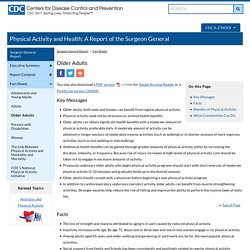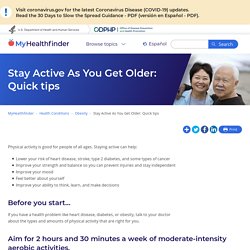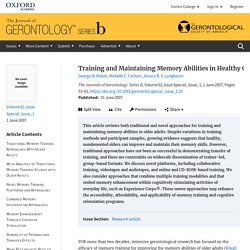

Keeping Seniors Active. As people age, it’s inevitable that they begin to slow down, but this shouldn’t mean they cease to be active.

Keeping fit and healthy in old age is important, for both physical health and emotional wellbeing, and finding ways to keep your loved ones active is a positive step in caring for them. Staying active can help preserve a sense of independence too, as well as helping to lower the risk of heart disease, stroke, diabetes, depression or dementia - all conditions associated with a sedentary lifestyle. Whether activity involves a series of low-level movements that can be carried out from a comfy chair or just getting out of the house to clubs and social events, there are many ways to tailor exercise to your loved one’s needs.
Here are just a few suggestions to help keep your elderly relatives active and engaged in later life: Daily walking Walking is a low-impact form of exercise, but an incredibly helpful one. Staying sociable Dulcie’s care story Keeping up with household chores. Why should they stay active? You may also download a PDF version[175KB]( for Adobe Acrobat Reader or a PostScript version [394KB]( .

Key Messages Older adults, both male and female, can benefit from regular physical activity. Physical activity need not be strenuous to achieve health benefits. Older adults can obtain significant health benefits with a moderate amount of physical activity, preferably daily. A moderate amount of activity can be obtained in longer sessions of moderately intense activities (such as walking) or in shorter sessions of more vigorous activities (such as fast walking or stairwalking).
Top of Page Facts The loss of strength and stamina attributed to aging is in part caused by reduced physical activity. Benefits of Physical Activity Helps maintain the ability to live independently and reduces the risk of falling and fracturing bones. What Communities Can Do. Quick summary of how older adults can stay active. Physical activity is good for people of all ages.

Staying active can help: Lower your risk of heart disease, stroke, type 2 diabetes, and some types of cancer Improve your strength and balance so you can prevent injuries and stay independent Improve your mood Feel better about yourself Improve your ability to think, learn, and make decisions Before you start... If you have a health problem like heart disease, diabetes, or obesity, talk to your doctor about the types and amounts of physical activity that are right for you.
Aim for 2 hours and 30 minutes a week of moderate-intensity aerobic activities. If you weren't physically active before, start slowly. Do muscle-strengthening activities 2 days a week. Try using exercise bands or lifting hand weights. Do balance activities. Mild Cognitive Impairment (MCI) - A Guide for the Public. Mild Cognitive Impairment (MCI) - A Guide for Professionals.
Key Facts of Cognitive impairment. What is cognitive ageing?
Training and Maintaining Memory Abilities in Healthy Older Adults: Traditional and Novel Approaches. We use cookies to enhance your experience on our website.By continuing to use our website, you are agreeing to our use of cookies.

You can change your cookie settings at any time. <a href=" Find out more</a> Skip to Main Content Search Close Advanced Search Search Menu Article Navigation Volume 62 Issue Special_Issue_1 1 June 2007 Article Contents Training and Maintaining Memory Abilities in Healthy Older Adults: Traditional and Novel Approaches George W. Bloomberg School of Public Health, The Johns Hopkins University, Baltimore, Maryland. Search for other works by this author on: Oxford Academic PubMed Google Scholar George W. Michelle C. Oxford Academic PubMed Google Scholar Michelle C. Jessica B. Oxford Academic PubMed Google Scholar Jessica B. The Journals of Gerontology: Series B, Volume 62, Issue Special_Issue_1, 1 June 2007, Pages 53–61, Published: 01 June 2007 This article reviews both traditional and novel approaches for training and maintaining memory abilities in older adults.
Issue Section: CHE Enrichment 2009.
Proven ways on how older adults should stay active (Websites)